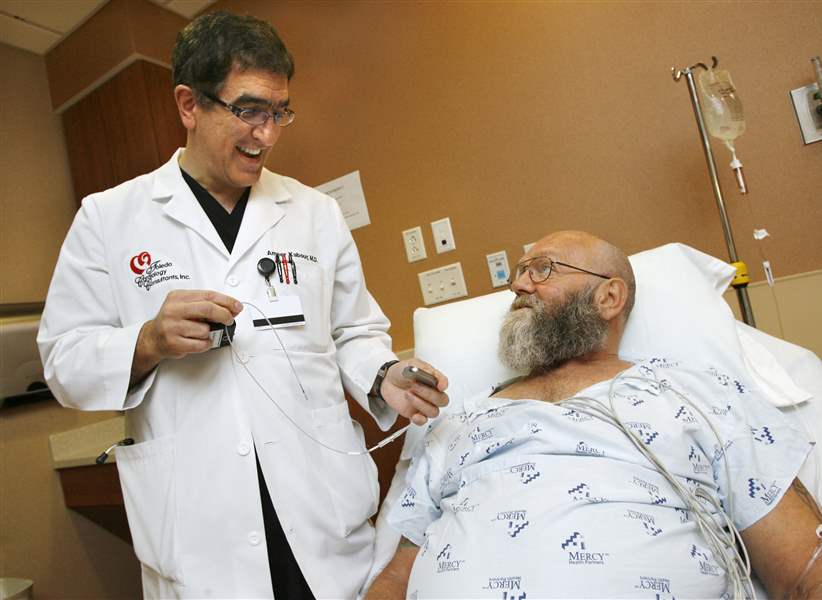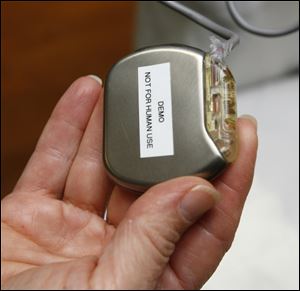
Toledoan gets heart-alert implant
Man 1st in state to have monitor that warns of impending attack
9/20/2011
Dr. Ameer Kabour shows John Ward, 63, of Toledo, a sample of the first AngelMed Guardian cardiac monitor that will be implanted in Mr. Ward’s chest.
The Blade/Dave Zapotosky
Buy This Image

Dr. Ameer Kabour shows John Ward, 63, of Toledo, a sample of the first AngelMed Guardian cardiac monitor that will be implanted in Mr. Ward’s chest.
More than once, Toledoan John Ward has gone to the emergency room with chest pains, only to be told he was not having a heart attack.
At Mercy St. Vincent Medical Center Monday, Mr. Ward, 63, had an experimental device implanted in his chest that he’s hoping will take away the worry about heart-attack symptoms. The AngelMed Guardian cardiac monitor and alert system is designed to immediately detect the early signs of a heart attack and thereby reduce the time for a patient to seek medical help.
“I didn’t want to sit at home and die,” Mr. Ward said when asked why he agreed to be part of the clinical trial.
He had a heart attack about two months ago, and last month a stent was inserted. He said the cardiac monitor, which has not yet obtained FDA approval, is preferable to having chest pains at home and stubbornly ignoring them or going to the hospital and getting sent home.
“This here will tell me, ‘You better get to the doctor,’” he said, adding that he hopes the device helps more than just himself. “I hope it helps more people in the years to come.”
Mr. Ward’s implant was the first in Ohio, although two other hospitals — the University of Toledo Medical Center, formerly the Medical College of Ohio, and Good Samaritan Hospital in Dayton — also are participating in the AngelMed clinical trials.
UTMC spokesman Meghan Cunningham said the medical center is recruiting patients for the trial and expects to perform its first implant before the end of the year.
Dr. Ameer Kabour, chief of cardiology at Mercy St. Vincent, said he has three or four other patients interested in the trials and may perform the next implant in the next 10 days.
The criterion is strict — prospective participants must have experienced a heart attack or undergone a procedure such as a stent, angioplasty, or bypass surgery within the last six months.

When the device detects an indication of a heart attack, it will vibrate and activate a pager the patient carries.
“It’s almost like putting a pacemaker in,” Dr. Kabour said about the implant procedure. “It’s exactly the same concept, with one lead going into the heart, and that will sense any kind of EKG changes in his heart before it’s demonstrated as a clinical symptom, so it’s much earlier than when the patient comes in with a heart attack.”
“We will detect it before it’s too late, before it causes damage to the heart,” Dr. Kabour said. “It’s really very advanced technology.”
Dr. Kabour said about 25 percent of the patients who come to the emergency room with chest pains are sent home because they are not having a heart problem.
“This actually is going to minimize the chance for him to come to the emergency room unnecessarily because if he is having some minor chest discomfort and this device is not beeping, technically he is safe,” Dr. Kabour said. “That means he is not at major risk. He can wait until he goes to see his doctor.”
People interested in taking part in the trial may contact the cardiac research department at Mercy St. Vincent, 419-251-4919.
Contact Jennifer Feehan at: jfeehan@theblade.com or 419-724-6129.